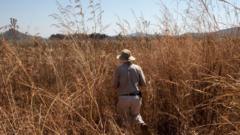In a landmark move, Zimbabwe's government has announced an initial payment of US$3 million as part of a larger commitment made in a 2020 agreement to compensate white farmers whose lands were seized under a controversial land redistribution program more than two decades ago. This payment is part of a total package that aims to reach US$3.5 billion to settle claims from former farm owners. The compensation relates to the significant land seizures that occurred primarily between 2000 and 2001, under President Robert Mugabe’s administration, which aimed to address historical injustices from the colonial era but ended up exacerbating the nation’s economic decline.
Zimbabwe Begins Historic Compensation for Former White Farmers Amid Economic Reform Efforts

Zimbabwe Begins Historic Compensation for Former White Farmers Amid Economic Reform Efforts
Zimbabwe's government initiates payments to white farmers affected by past land seizures, marking a pivotal movement towards economic rehabilitation.
This first round of payments covers 378 farms out of 740 approved for compensation, amounting to approximately 1% of the total allocated funds of US$311 million. According to Finance Minister Mthuli Ncube, the remainder will be compensated through US-dollar denominated Treasury bonds, showcasing Zimbabwe's commitment to reforming its economy and clearing financial arrears. "We have now begun to honour that agreement," Ncube stated, emphasizing the importance of this initiative in rebuilding the nation’s economic ties.
While some farmers have expressed interest in the compensation deal, many others remain hesitant to sign up. The government has only committed to compensating for "improvements" made on former farms rather than the land itself, citing that the land was unjustly taken during colonial times. In a related effort, foreign investors with protected agricultural interests are also being compensated under separate agreements, indicating a broader approach to economic reform.
As Zimbabwe navigates its post-colonial landscape, President Emmerson Mnangagwa, who succeeded Mugabe, has taken steps to mend relationships with Western nations, aiming to restore economic partnerships and integration into the global financial system. Holding onto the irreversible process of land reform, Mnangagwa remains committed to compensating former farm owners as a strategy to foster international goodwill.
With Zimbabwe's economy grappling from over two decades of isolation and high foreign debt, the recent compensation effort could signal an important step towards establishing credibility with international bodies and improving the nation's financial standing, potentially opening doors for foreign investment in the future.
Thus, as this historic compensation begins, Zimbabwe stands at a critical juncture in its efforts to reconcile its past injustices while seeking a sustainable economic future.
While some farmers have expressed interest in the compensation deal, many others remain hesitant to sign up. The government has only committed to compensating for "improvements" made on former farms rather than the land itself, citing that the land was unjustly taken during colonial times. In a related effort, foreign investors with protected agricultural interests are also being compensated under separate agreements, indicating a broader approach to economic reform.
As Zimbabwe navigates its post-colonial landscape, President Emmerson Mnangagwa, who succeeded Mugabe, has taken steps to mend relationships with Western nations, aiming to restore economic partnerships and integration into the global financial system. Holding onto the irreversible process of land reform, Mnangagwa remains committed to compensating former farm owners as a strategy to foster international goodwill.
With Zimbabwe's economy grappling from over two decades of isolation and high foreign debt, the recent compensation effort could signal an important step towards establishing credibility with international bodies and improving the nation's financial standing, potentially opening doors for foreign investment in the future.
Thus, as this historic compensation begins, Zimbabwe stands at a critical juncture in its efforts to reconcile its past injustices while seeking a sustainable economic future.




















